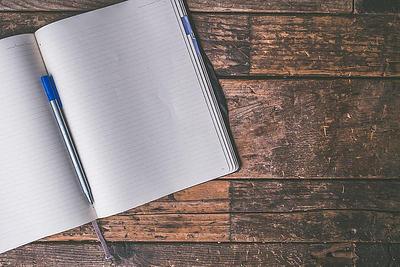Looking for all Articles by Andrew Pettigrew?
Five tips for writing a rounded disabled character
Andrew Pettigrew shares his advice for writing believable disabled characters

How many times have you opened a book and found a character with additional needs inside? For me, as a deafblind teenager: disappointingly few. It's a sad fact that people with additional needs are not as well represented as they could - should - be in today's literature, just like many other minorities in society. Perhaps you want to pen a story with a disabled character but you're afraid of upsetting people? Don't worry - this blog will hopefully help you to write a plausible disabled character that your audience will love to read about.
It's not just about disability
"It's part of us, but it's not who we are"
Sure, disability greatly impacts on an individual's life, but the majority of the disabled community don't revolve around this. It's part of us, but it's not who we are. We have other things to talk about, just as any other person does. For instance, my disabilities (yes, I have more than one!) don't stop me from reading, drumming, trampolining, and whatever else.
So when you're developing your disabled character, remember that. This is probably the most important advice I can give you.
No cliches, please
I'm going to say it - as much as I love fantasy, I'm getting seriously tired of the old blind man 'seeing' into the future. Or the deaf kid who gets back his hearing as a gift from a mysterious deity. Come on, people, that's even a little offensive - the idea that we as disabled people can't do amazing things just as we are!
Why am I ranting on about this? Because if you really want to make a nice, realistic disabled character, it might be a good idea to make them 'normal' human beings. That's not to say that it's a terrible idea giving them superpowers or whatever - after all, who doesn't love Rick Riordan's deaf elf Hearthstone in the Magnus Chase series? - but we are a part of society and, like the LGBTQ community, we need acceptance most of all.
We can be popular, too
I'm not any kind of monument for popularity, but it's important to note that not all disabled people are bullied. Socialising is more difficult, no denying it, and I've definitely had my fair share of exclusion or rejection. Yet, faced with it, I also did not shrink to gnome-size, squeak timidly, and curl into a ball like an overgrown hedgehog. So consider this before you start formulating your character. OK, maybe I'm coming back to cliches again, but we can stick up for ourselves as well or better than our friends can for us. Just something to think about.
Don't be scared
I know it's easy for me to talk about creating disabled characters - I am disabled! But don't be scared of creating one. Really.
If you are afraid of offending someone, then do your research — you'd be surprised. There are lots of helpful organisations out there, such as Sense Scotland(this link will open in a new window), the Royal National Institute of the Blind(this link will open in a new window), Deafblind Scotland(this link will open in a new window) and so many more. These organisations work directly with disabled people, especially young people, and I guarantee they'd be more than willing to help you out if you contact them.
Why it's important
"Books are the greatest teachers"
So now we've gone through a few tips, perhaps you might still be wondering - why is it important to include disabled characters in books? Because books are the greatest teachers. No, seriously. If there's a wonderful, plausible character with additional needs in a novel, stereotypes (ahem, I'm looking at you, Mr Blind Man Who Sees Into The Future) will start to get squashed. It'll definitely help the disabled community feel less isolated in society and more included, as well as encouraging non-disabled people to help and interact with us more.
For example, I once heard from a disabled friend that he struggled to obtain assistance whilst shopping and, afterwards, the person who did eventually help them admitted they'd been apprehensive to do so in the first place. Whether their anxiety was due to making a mistake, accidentally patronising him, or a genuine fear of disabled people, I don't know, but I think disabled characters in books could definitely help improve this situation.